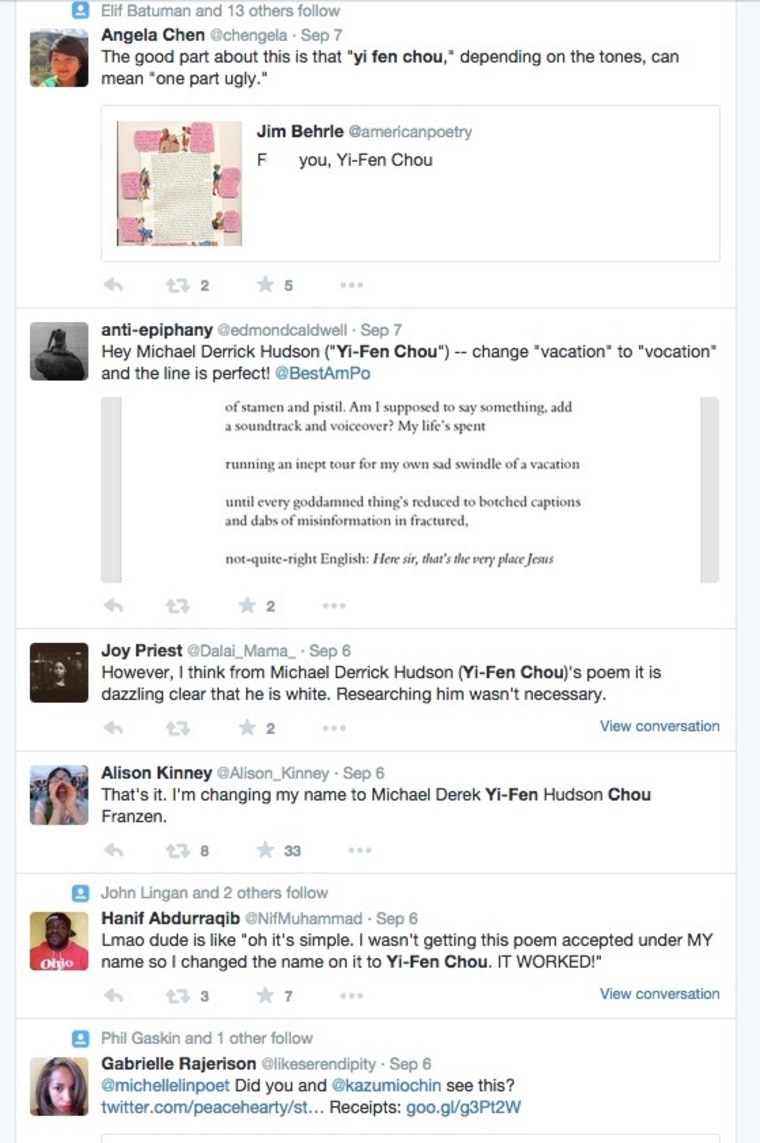Earlier this week the annual anthology “The Best American Poetry 2015” came out. Many readers were surprised and even appalled to learn that a poem called “The Bees, the Flowers, Jesus, Ancient Tigers, Poseidon, Adam, and Eve,” published under the name Yi-Fen Chou, was the work of a poet called Michael Derrick Hudson.
The white male author stated in his contributor’s note that he used the pseudonym because his poem kept getting rejected under his real name.
Hudson’s assumption of a Chinese-American identity — which he chalks up to his “persistence” — has shocked and appalled many people, who took to Twitter to voice their upset (an obscenity has been blotted out). And, according to the New York Times, the family of a woman named Yi-Fen Chou, who attended the same high school as Hudson, has even stepped forward to complain.

Asian Americans are especially stung by Hudson’s move.
“What he did was troubling in at least two ways,” Timothy Yu, director of the Asian American Studies Program at the University of Wisconsin-Madison, told TODAY.com. “First, it fits into a long tradition of ‘yellowface,’ or of white Americans appropriating Asian identities and culture."
"But I’m more troubled by Hudson’s implication that it is easier to get published as a person of color than as a white person," he added. "That’s simply not true. It’s still the case that writers of color are massively underrepresented in publishing. Hudson’s act plays into a story of ‘political correctness’ or ‘reverse racism’ in publishing that is deeply misleading.”
RELATED: Study shows huge lack of diversity in Hollywood
Sherman Alexie, the co-editor of the anthology has indicated that he felt outraged when he learned of Hudson’s real identity, and that part of the reason he selected Hudson’s poem in the first place was because he believed it was submitted by a Chinese-American poet. But undoubtedly, Alexie also wanted to render a book that represented the many cultures of America to its best ability. He was doing what all people in hiring positions should be doing: actively supporting diversity.
“[When recruiting] you have to intentionally create a diverse candidate pool,” Steve Humerickhouse, executive director of the forum on workplace inclusion with Opus College of Business at the University of St. Thomas, told TODAY.
Alexie’s biggest mistake was that he didn’t look past the poet’s name — which turned out to be fake.

“Making assumptions based on one’s name is a dangerous, slippery slope. It fails to account for someone adopting the name of their spouse, who has what some may say traditionally connotes a particular race,” Michelle Lee Flores, an employment attorney, litigation and compliance adviser, told TODAY. “It also fails to account for the change of a name in light of the adoption of a religion or a religious-based culture and faith-based name. Finally, it fails to recognize the blending (biracial or multiracial) of America.”
RELATED: University of Alabama Alpha Phi sorority criticized for recruitment video
And while a literary competition invites submissions, in real, everyday workplaces, employers have to actively seek candidates. They should be aligned with legitimate organizations working toward diversity.
“Don’t expect diverse candidates to seek you out; actively seek them out by sending your job openings to diverse professional organizations such as the National Black MBA Association (NBMBAA) or the Association of Latino Professional for America (ALPFA)," said Humerickhouse. "Make sure community colleges, nonprofits and minority placement services receive your openings, for example the Hispanic Alliance for Career Enhancement (HACE)."
RELATED: Comic book 'Raising Dion' takes on superhero diversity for women and minorities
Alexie accused himself of “racial nepotism,” saying that he gave who he thought was a brown-skinned poet a chance because he too is brown-skinned. This type of bias is common, but it should never serve as an excuse for hiring or not hiring someone.
“Nowadays, the standard employer line is to call oneself an ‘equal opportunity employer’ and to claim the intention to hire the most ‘qualified person for the job,’” said Gregg Ward, an executive coach and entrepreneur. “Sadly, due to unconscious biases, most employers still find themselves hiring the candidate who 'looks most like them,' perpetuating racial and gender disparity. This is especially true at the senior-most levels of most companies.”
“We all have unconscious bias — it is part of being human,” added Humerickhouse. “Recruiters, hiring managers and those in talent management all need training in how to overcome their bias.”